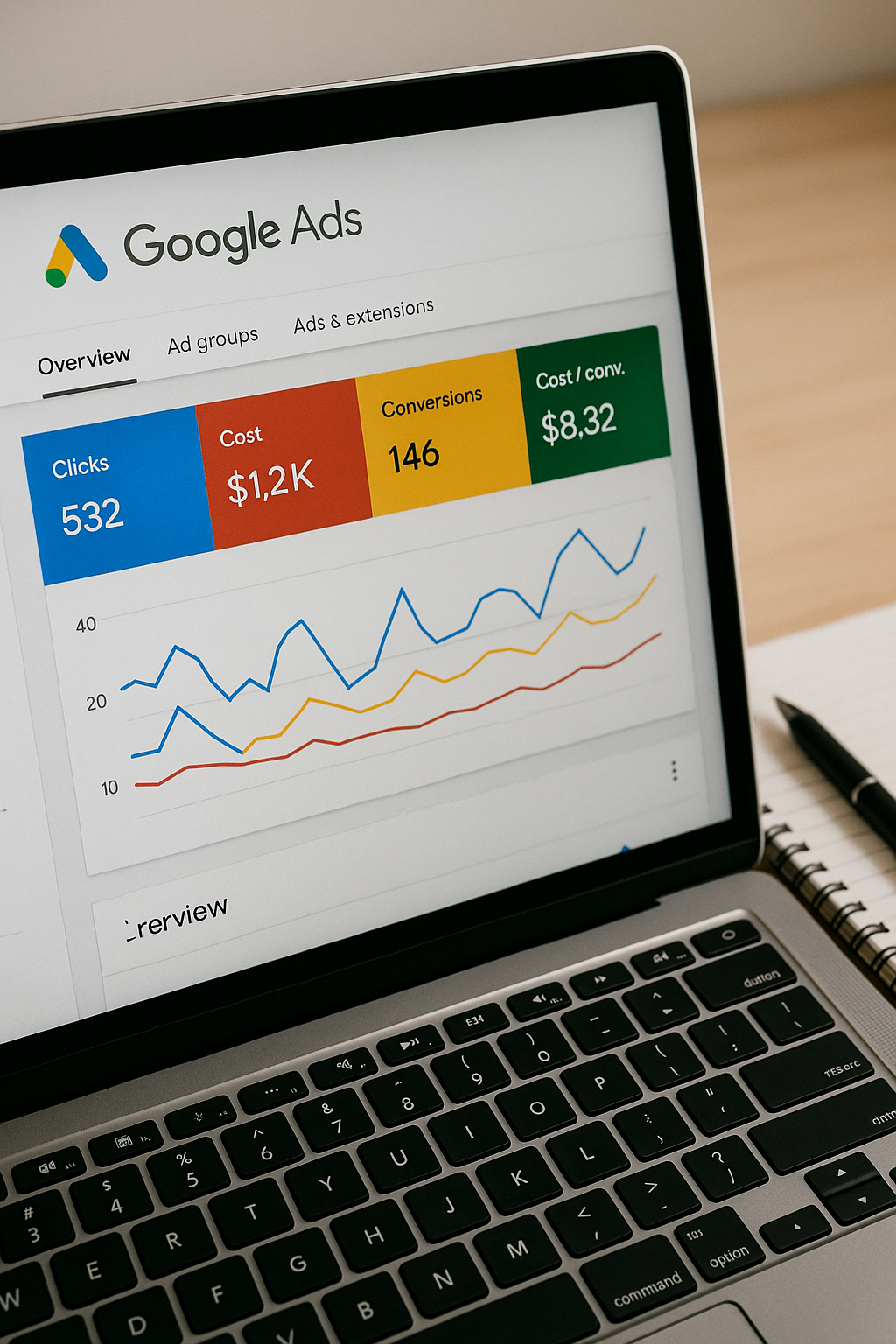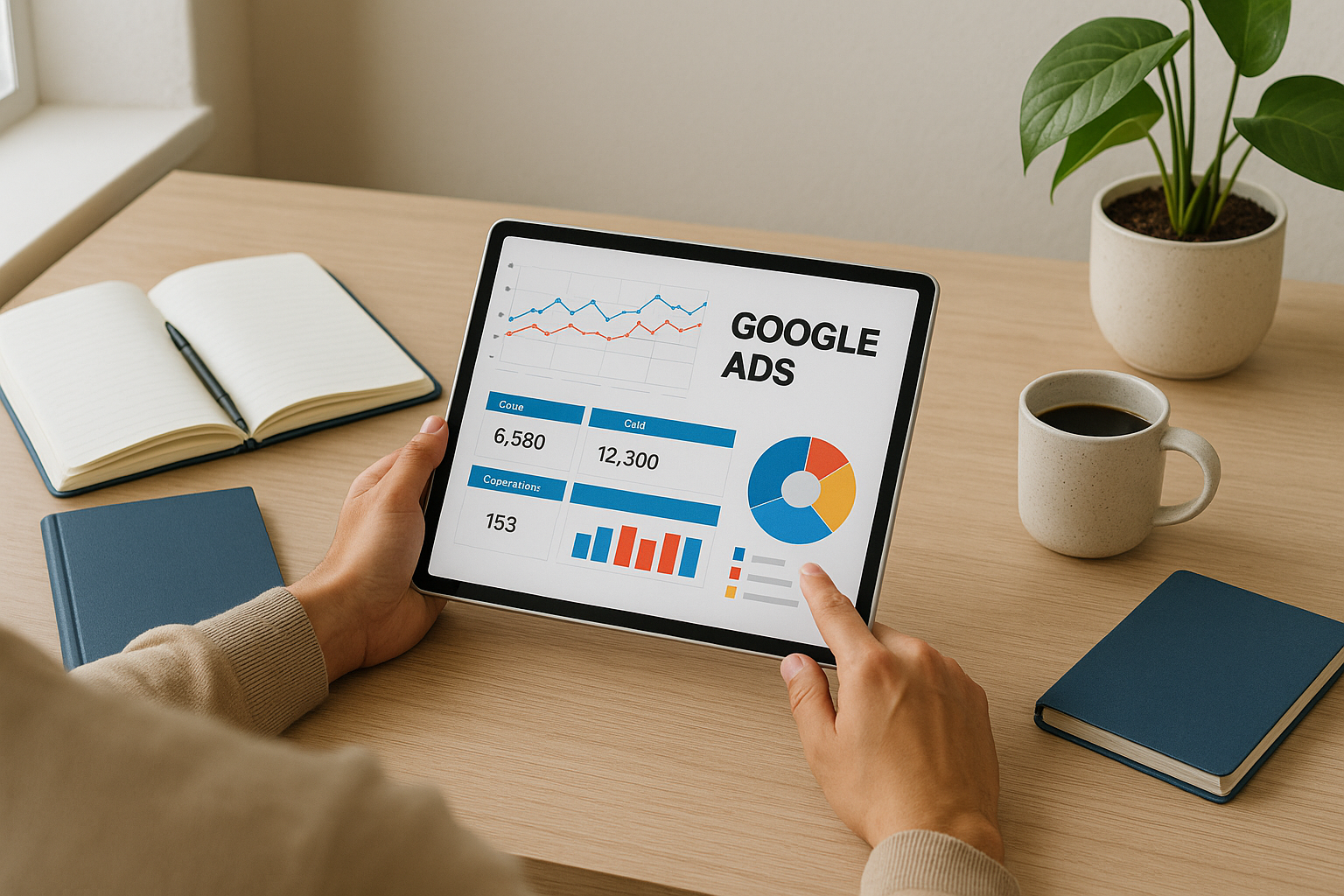
Introduction to Google advertising strategy
Google advertising is a powerful tool for companies seeking to increase their online visibility and sales. However, to get the most out of this tool, it's crucial to avoid some common mistakes. This article provides advice on an effective Google advertising strategy to optimize your Google advertising budget, and tips on how to avoid common pitfalls.

What is Google Ads?
Google Ads is Google's online advertising platform that enables companies to display ads on search results and other partner sites. By using this platform, we make it easier for companies to reach potential customers when they are looking for similar products or services.
The different types of Google Ads campaigns
There are several types of campaign available on Google Ads, including search campaigns, display campaigns, video campaigns and shopping campaigns. Each type of campaign has its own advantages and can be used according to a company's specific marketing objectives.
How do you choose the right type of campaign for your company? There's no easy answer. That's why we take a close look at a number of elements that are crucial to making the right choice of campaign, starting with an analysis of your market and your objectives, which then enables us to develop a Google advertising strategy for selecting the right campaigns.

Why invest in Google advertising?
Investing in Google advertising enables businesses to reach a large audience, increase their visibility and generate qualified leads. It's an effective way of reaching potential customers when they're most receptive.
How to optimize your Google advertising budget
To maximize the effectiveness of your advertising budget, it's essential to adopt a structured approach based on a relevant Google Ads strategy. Here are just a few of the things we look out for when creating Google Ads campaigns:
Define clear objectives
Before launching a campaign, it's crucial to define clear, measurable objectives. Whether you want to increase brand awareness or generate sales, having a clear objective will enable you to structure your campaigns more effectively.
Without a clear objective, we don't run Google ads. Why not? It's a bit like taking your car out for a drive without a destination, it's not very smart or efficient.
Choosing the right keywords
Researching relevant keywords is a fundamental step. We use tools like Google's Keyword Planner and other specific tools to identify the terms your potential customers are using. This enables us to create targeted ads that attract the right people.
Using ad extensions
Ad extensions enrich your ads with additional information, such as links to specific pages on your site or contact information. This increases click-through rates and improves campaign performance.
Common mistakes to avoid in Google advertising
It's just as important to know the mistakes to avoid in order to optimize your advertising budget. On Google Ads, every mistake can cost you money, but what's worse, it's money that isn't invested in ads that work well.
That's why we offer a monthly Google Ads campaign optimization follow-up. What does it involve? An expert in Google Ads and data analysis will monitor your Google Ads account several times a week, analyzing trends and making any necessary changes to improve your Google Ads performance.
Ignore data analysis
Without regular, in-depth analysis of your Google Ads campaigns, it's impossible to effectively optimize your Google advertising budget. Using tools like Google Analytics can help you understand which ads perform best and why.
Failure to adapt ads to the target audience
It's essential to tailor messages to consumers' needs and behaviors. Targeting too broadly can dilute the message and reduce the impact of ads.
The Google advertising strategy initially established can therefore evolve, too, according to the objectives sought and the results achieved. It's inefficient to persevere with under-performing campaigns when we can concentrate on optimizing over-performing ones.
Neglecting Google Ads conversion tracking
Conversion data provides valuable information on user behavior and campaign profitability. By integrating tracking tools, such as Google Ads conversion tracking, we can adjust the Google advertising strategy in real time, in agreement with the company.
Tracking Google Ads conversions can be a complex thing to set up, but also to define. Once again, Google's advertising strategy will define what we need to track as conversions or not.
Omit Google Ads A/B tests
Testing different versions of ads helps to determine what works best. This can include variations in text, images or calls to action.
In the same way as with Meta AdsIt's important to test. To do this effectively, we've devised a methodology that enables us to more quickly identify what's performing well, so we can optimize campaigns faster and more efficiently.
Adapting ads to mobile devices
We make sure your ads are optimized for smartphone and tablet users. But first, companies need to make sure their website is responsive.
To do this, we have tools that can perform highly detailed analyses of your website, enabling you to quickly identify the pages that need to be improved. This is essential, as it can have a direct impact on the conversion rate and therefore on incoming requests.
How to optimize Google advertising for small businesses
Small businesses can benefit from Google advertising by adopting a specific Google advertising strategy tailored to their business objectives.
Local ads
Local ads can target nearby customers, which is particularly beneficial for businesses with a physical location. The questions are: What should be promoted? In what way? In what space? With a Google advertising strategy, we answer all these questions.
Limited budget
With an often limited budget, it's essential to choose keywords wisely and focus on specific targeting strategies to maximize the effectiveness of advertising spend.
Finding the right keywords isn't as easy as you might think. You've got keywords in mind, but are they really what users are looking for? Aren't there cheaper keywords that generate better results?
Thanks to our regular analysis, we can, among other things, optimize this by making a detailed analysis of your market and your results. We are able to find the cheapest keywords generating the best results in line with your objectives.
Effective Google advertising strategy to boost sales
Adopting an effective Google advertising strategy is the first step in enabling your company to significantly improve the results of your campaigns.
Remarketing
Remarketing allows you to retarget users who have already visited your site, reminding them of your products or services. The Google advertising strategy we're implementing takes this a step further, with very precise segmentation of your audience.
The advantage? We're able to offer advertising that matches users' profiles and engages them even more with your company.
Promotions and special offers
Proposing special offers or promotions can encourage users to click on your ads and make a purchase.
It's often used by e-commerce companies or industries where this is a regular occurrence. But it's not for everyone. When this isn't the case, we find other hooks that make users want to know more about your company.
Best practices for Google advertising in 2025
In 2025, it's essential to follow trends and adapt your Google advertising strategy accordingly.
Adopt a user-centric approach
Focus on the user experience by optimizing your landing pages and making sure your site is easy to navigate. If we're going to redirect traffic to your website, it's vital that it works perfectly.
In addition to being pleasant to navigate, it must also be clear. The user must be able to immediately understand what service you're offering, and what you're proposing. If this isn't the case, you'll quickly lose interest and conversions.
Tracking market trends
Consumer trends change rapidly, and what works today may not be as effective tomorrow. It's important to keep abreast of new Google Ads features, which come along all the time.
It's also for this reason that working with a Google Ads as Lead Agency is a real advantage. Our experts are currently working on more than 100 Google Ads accounts for customers, and they are confronted with the new features on a daily basis.
When a new feature might be of interest to one of our customers, we talk to them about it and make the necessary changes when required.
Conclusion
Google advertising offers a wealth of opportunities for businesses. By optimizing your budget, targeting the right keywords, testing different ad formats and analyzing performance, we can create effective campaigns that boost your sales.
Adopting an effective Google advertising strategy is essential to stand out in a competitive environment and achieve your business objectives.
Google advertising FAQs
How to optimize Google advertising for small businesses?
By targeting specific keywords and adjusting bids according to performance.
What are the best practices for Google advertising in 2025?
Implement a real Google advertising strategy, optimize landing pages and monitor ad performance regularly.
How do you measure the return on investment of Google advertising?
By analyzing conversions and calculating the cost per acquisition in relation to revenues generated. It's vital to ensure that conversion tracking is both well implemented and relevant.
Common mistakes to avoid in Google advertising
Not defining clear objectives based on an effective Google advertising strategy, not carrying out regular in-depth analyses of your data, and not testing different ads.
How to combine Google advertising and SEO effectively?
By using similar keywords and integrating ads into an overall content strategy. This is essential because SEA (Google advertising) and SEO (search engine optimization) work together. If you want to improve your campaigns, you also need to get your SEO right.
Why is it important to use ad extensions?
Ad extensions enrich your ads with additional information, increasing click-through rates and user engagement.
